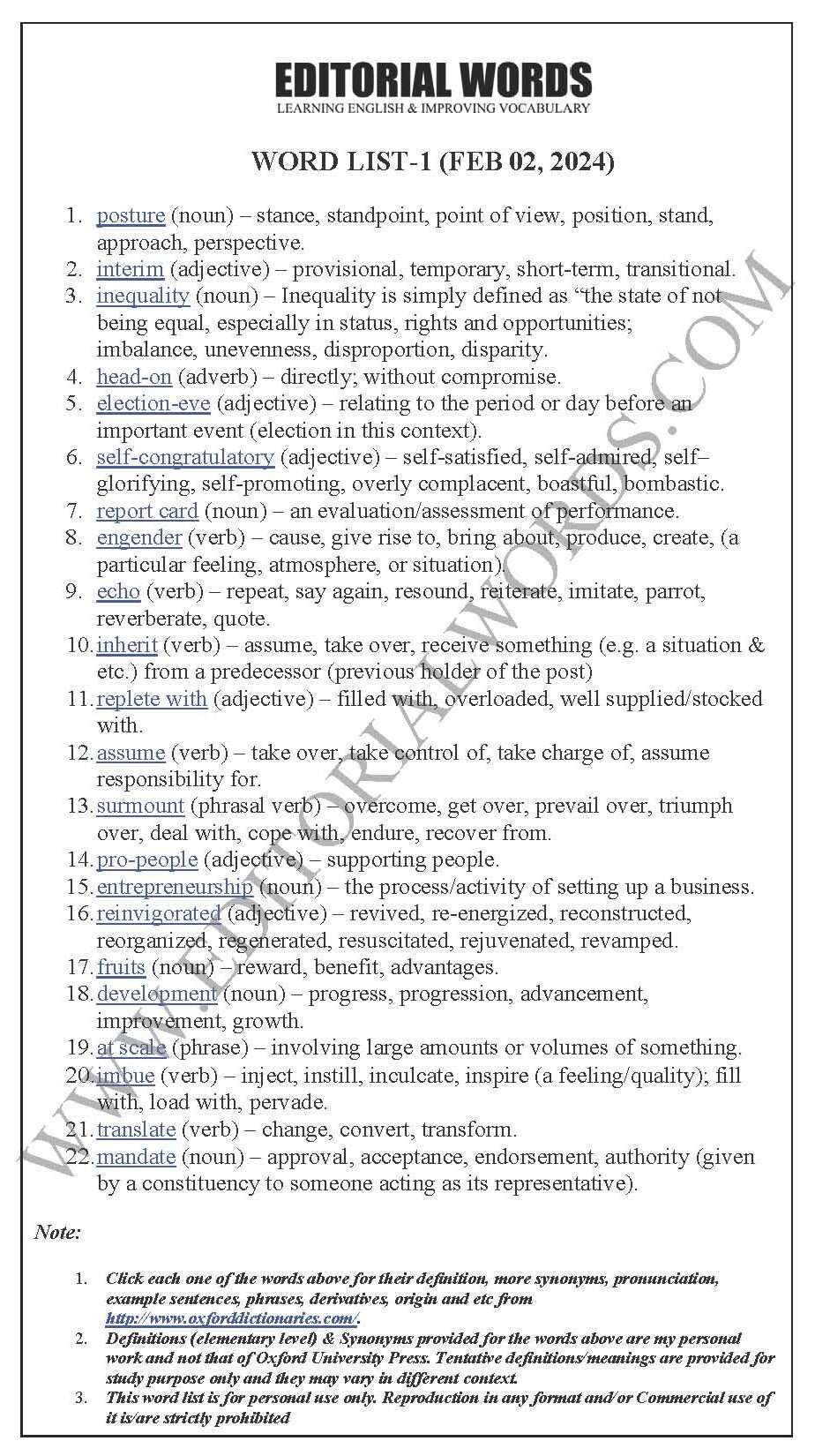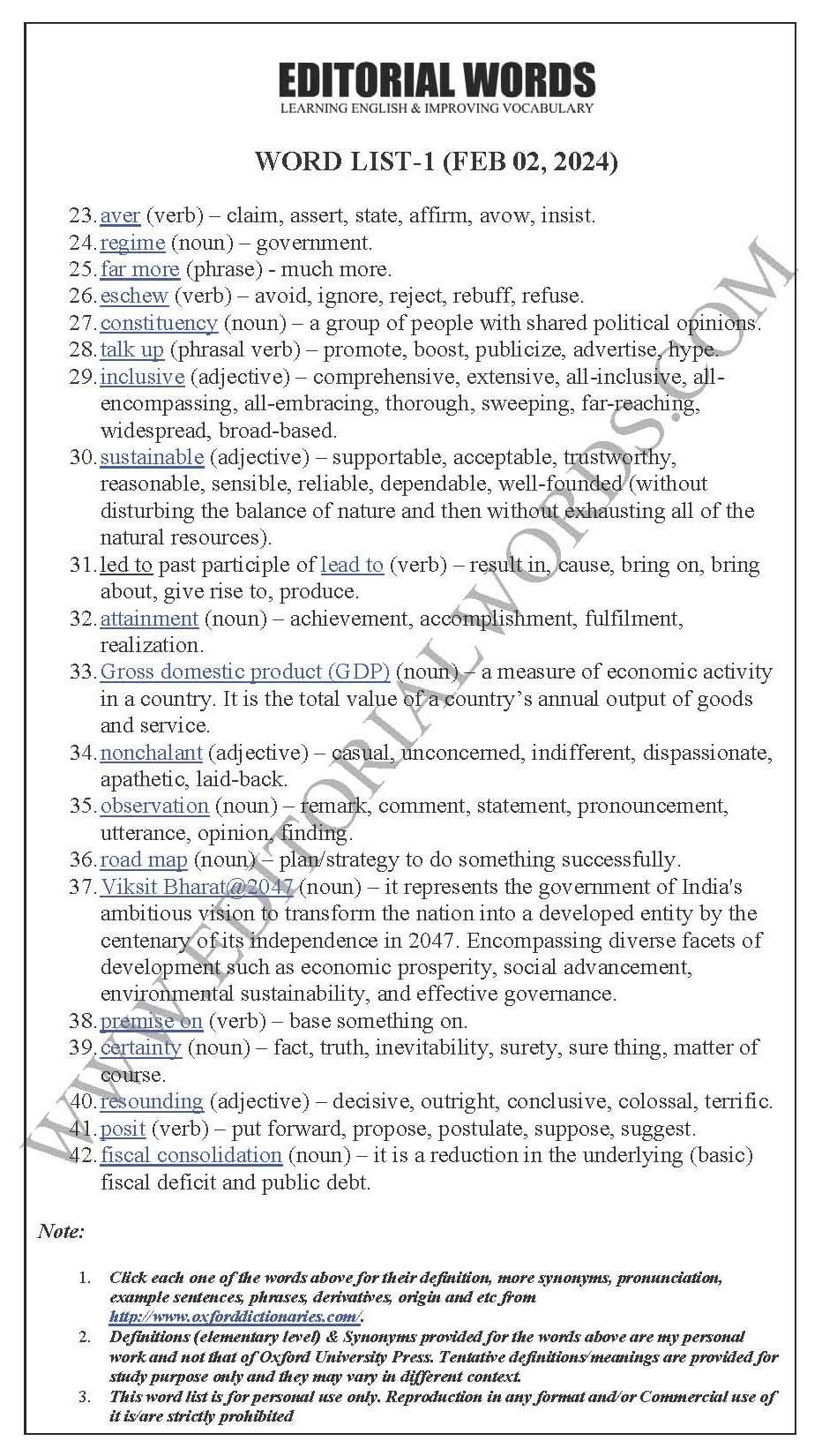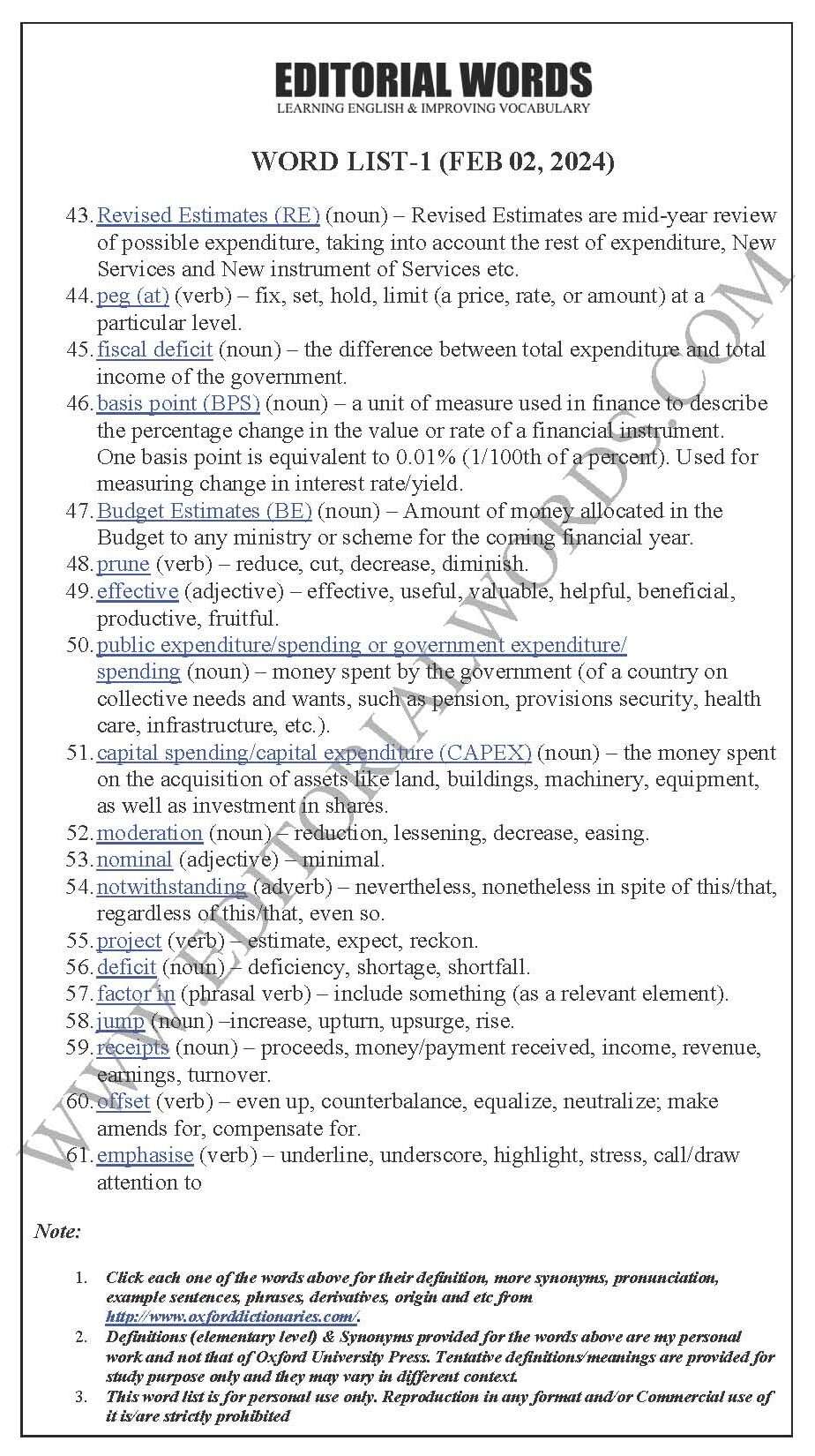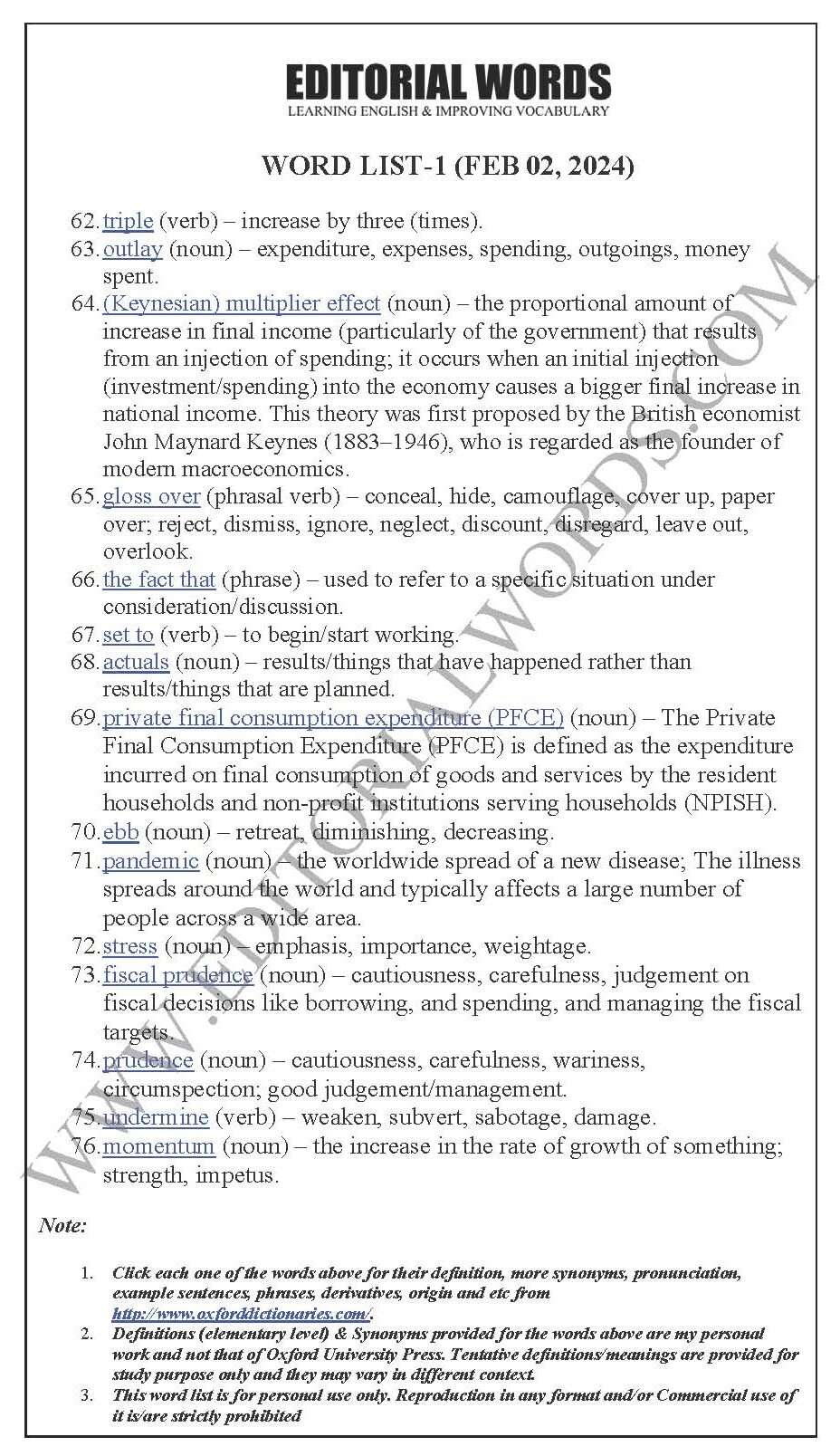The Hindu Editorial (Poll posture) – Feb 02, 2024
To read this article, click “The Hindu”.
This preview is provided here with permission.
Courtesy: The Hindu
The Hindu Editorial (Poll posture) – Feb 02, 2024:
- posture (noun) – stance, standpoint, point of view, position, stand, approach, perspective.
- interim (adjective) – provisional, temporary, short-term, transitional.
- inequality (noun) – Inequality is simply defined as “the state of not being equal, especially in status, rights and opportunities; imbalance, unevenness, disproportion, disparity.
- head-on (adverb) – directly; without compromise.
- election-eve (adjective) – relating to the period or day before an important event (election in this context).
- self-congratulatory (adjective) – self-satisfied, self-admired, self–glorifying, self-promoting, overly complacent, boastful, bombastic.
- report card (noun) – an evaluation/assessment of performance.
- engender (verb) – cause, give rise to, bring about, produce, create, (a particular feeling, atmosphere, or situation).
- echo (verb) – repeat, say again, resound, reiterate, imitate, parrot, reverberate, quote.
- inherit (verb) – assume, take over, receive something (e.g. a situation & etc.) from a predecessor (previous holder of the post)
- replete with (adjective) – filled with, overloaded, well supplied/stocked with.
- assume (verb) – take over, take control of, take charge of, assume responsibility for.
- surmount (phrasal verb) – overcome, get over, prevail over, triumph over, deal with, cope with, endure, recover from.
- pro-people (adjective) – supporting people.
- entrepreneurship (noun) – the process/activity of setting up a business.
- reinvigorated (adjective) – revived, re-energized, reconstructed, reorganized, regenerated, resuscitated, rejuvenated, revamped.
- fruits (noun) – reward, benefit, advantages.
- development (noun) – progress, progression, advancement, improvement, growth.
- at scale (phrase) – involving large amounts or volumes of something.
- imbue (verb) – inject, instill, inculcate, inspire (a feeling/quality); fill with, load with, pervade.
- translate (verb) – change, convert, transform.
- mandate (noun) – approval, acceptance, endorsement, authority (given by a constituency to someone acting as its representative).
- aver (verb) – claim, assert, state, affirm, avow, insist.
- regime (noun) – government.
- far more (phrase) – much more.
- eschew (verb) – avoid, ignore, reject, rebuff, refuse.
- constituency (noun) – a group of people with shared political opinions.
- talk up (phrasal verb) – promote, boost, publicize, advertise, hype.
- inclusive (adjective) – comprehensive, extensive, all-inclusive, all-encompassing, all-embracing, thorough, sweeping, far-reaching, widespread, broad-based.
- sustainable (adjective) – supportable, acceptable, trustworthy, reasonable, sensible, reliable, dependable, well-founded (without disturbing the balance of nature and then without exhausting all of the natural resources).
- led to past participle of lead to (verb) – result in, cause, bring on, bring about, give rise to, produce.
- attainment (noun) – achievement, accomplishment, fulfilment, realization.
- Gross domestic product (GDP) (noun) – a measure of economic activity in a country. It is the total value of a country’s annual output of goods and service.
- nonchalant (adjective) – casual, unconcerned, indifferent, dispassionate, apathetic, laid-back.
- observation (noun) – remark, comment, statement, pronouncement, utterance, opinion, finding.
- road map (noun) – plan/strategy to do something successfully.
- Viksit Bharat@2047 (noun) – it represents the government of India’s ambitious vision to transform the nation into a developed entity by the centenary of its independence in 2047. Encompassing diverse facets of development such as economic prosperity, social advancement, environmental sustainability, and effective governance.
- premise on (verb) – base something on.
- certainty (noun) – fact, truth, inevitability, surety, sure thing, matter of course.
- resounding (adjective) – decisive, outright, conclusive, colossal, terrific.
- posit (verb) – put forward, propose, postulate, suppose, suggest.
- fiscal consolidation (noun) – it is a reduction in the underlying (basic) fiscal deficit and public debt.
- Revised Estimates (RE) (noun) – Revised Estimates are mid-year review of possible expenditure, taking into account the rest of expenditure, New Services and New instrument of Services etc.
- peg (at) (verb) – fix, set, hold, limit (a price, rate, or amount) at a particular level.
- fiscal deficit (noun) – the difference between total expenditure and total income of the government.
- basis point (BPS) (noun) – a unit of measure used in finance to describe the percentage change in the value or rate of a financial instrument. One basis point is equivalent to 0.01% (1/100th of a percent). Used for measuring change in interest rate/yield.
- Budget Estimates (BE) (noun) – Amount of money allocated in the Budget to any ministry or scheme for the coming financial year.
- prune (verb) – reduce, cut, decrease, diminish.
- effective (adjective) – effective, useful, valuable, helpful, beneficial, productive, fruitful.
- public expenditure/spending or government expenditure/spending (noun) – money spent by the government (of a country on collective needs and wants, such as pension, provisions security, health care, infrastructure, etc.).
- capital spending/capital expenditure (CAPEX) (noun) – the money spent on the acquisition of assets like land, buildings, machinery, equipment, as well as investment in shares.
- moderation (noun) – reduction, lessening, decrease, easing.
- nominal (adjective) – minimal.
- notwithstanding (adverb) – nevertheless, nonetheless in spite of this/that, regardless of this/that, even so.
- project (verb) – estimate, expect, reckon.
- deficit (noun) – deficiency, shortage, shortfall.
- factor in (phrasal verb) – include something (as a relevant element).
- jump (noun) –increase, upturn, upsurge, rise.
- receipts (noun) – proceeds, money/payment received, income, revenue, earnings, turnover.
- offset (verb) – even up, counterbalance, equalize, neutralize; make amends for, compensate for.
- emphasise (verb) – underline, underscore, highlight, stress, call/draw attention to
- triple (verb) – increase by three (times).
- outlay (noun) – expenditure, expenses, spending, outgoings, money spent.
- (Keynesian) multiplier effect (noun) – the proportional amount of increase in final income (particularly of the government) that results from an injection of spending; it occurs when an initial injection (investment/spending) into the economy causes a bigger final increase in national income. This theory was first proposed by the British economist John Maynard Keynes (1883–1946), who is regarded as the founder of modern macroeconomics.
- gloss over (phrasal verb) – conceal, hide, camouflage, cover up, paper over; reject, dismiss, ignore, neglect, discount, disregard, leave out, overlook.
- the fact that (phrase) – used to refer to a specific situation under consideration/discussion.
- set to (verb) – to begin/start working.
- actuals (noun) – results/things that have happened rather than results/things that are planned.
- private final consumption expenditure (PFCE) (noun) – The Private Final Consumption Expenditure (PFCE) is defined as the expenditure incurred on final consumption of goods and services by the resident households and non-profit institutions serving households (NPISH).
- ebb (noun) – retreat, diminishing, decreasing.
- pandemic (noun) – the worldwide spread of a new disease; The illness spreads around the world and typically affects a large number of people across a wide area.
- stress (noun) – emphasis, importance, weightage.
- fiscal prudence (noun) – cautiousness, carefulness, judgement on fiscal decisions like borrowing, and spending, and managing the fiscal targets.
- prudence (noun) – cautiousness, carefulness, wariness, circumspection; good judgement/management.
- undermine (verb) – weaken, subvert, sabotage, damage.
- momentum (noun) – the increase in the rate of growth of something; strength, impetus.
Note :
1. Click each one of the words above for their definition, more synonyms, pronunciation, example sentences, phrases, derivatives, origin and etc. from http://www.oxforddictionaries.com/.
2. Definitions (elementary level) & Synonyms provided for the words above are my personal work and not that of Oxford University Press. Tentative definitions/meanings are provided for study purposes only and they may vary in a different context.
3. This word list is for personal use only. Reproduction in any format and/or Commercial use of it is/are strictly prohibited.
The Hindu Editorial (Poll posture) – Feb 02, 2024:




“Phrasal Verbs” We Learnt Last Week
“Idioms & Phrases” We Learnt Last Week
“Important Definitions” We Learnt Last Week
Recent Word Lists For The Hindu Editorial Articles

Finance Minister Nirmala Sitharaman’s sixth consecutive Budget speech was an election-eve, self-congratulatory report card on the economic achievements engendered by Prime Minister Narendra Modi and the two governments he has led since 2014… For further reading, visit “The Hindu”. Below is today’s word list-1 for The Hindu Editorial (Poll posture) – Feb 02, 2024.